Navigating Grief: Coping with the Loss of a Pet Bird
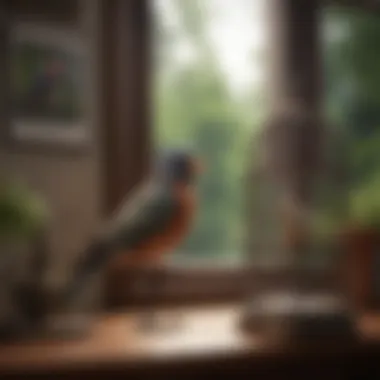
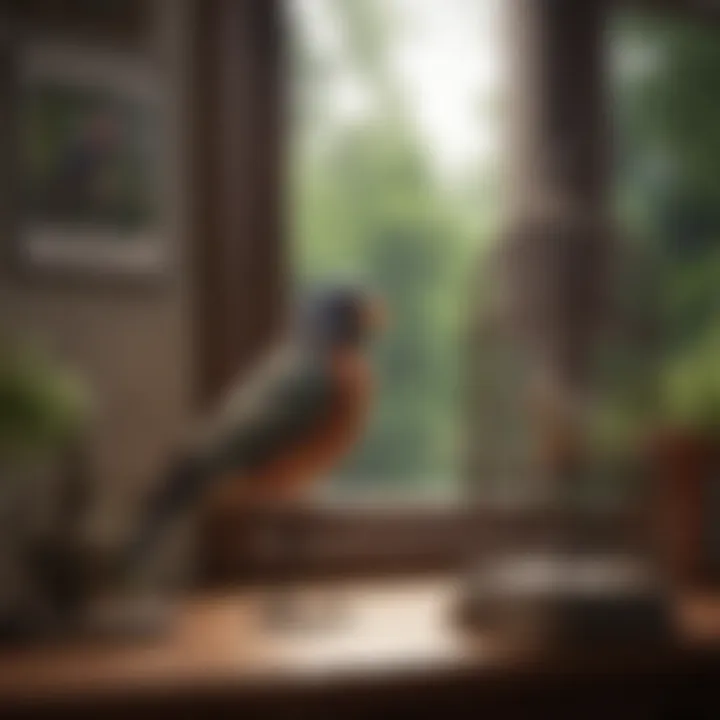
Intro
Losing a pet bird is an experience laden with complex emotions. Birds often become more than pets; they transform into valued companions. This bond interweaves daily routines, shared experiences, and emotional exchanges. When death occurs, grief can be a profound reality for owners. This section guides through the nuances of what this grief entails
The journey of navigating grief is unique for each individual. Understanding its dimensions can promote healthier emotional processing. Recognizing that mourning the loss of a bird can differ from other types of losses is essential. Grief in these situations is often accompanied by guilt, anger, and deep sadness.
This article aims to shed light on the emotional burdens that accompany the loss of a bird. It will explore how to cope, memorialize, and re-establish a sense of normalcy after such a loss. Moreover, practical advice for bird care is provided alongside discussions about grief.
In essence, the focus is not only on coping but also on understanding how to reflect on a meaningful connection that transcends the bond between bird and owner. Below, let us begin with the key aspects surrounding pet care.
The Emotional Impact of Losing a Pet Bird
Losing a pet bird is more than just an experience of grief; it is the culmination of a relationship filled with unique moments and deep connections. Birds, with their vibrant personalities and companionship, often become central figures in our lives. When they pass away, it can leave a huge void, leading to a complex emotional reaction. Understanding this emotional impact is crucial for pet owners. It allows them to recognize their feelings and take steps for healing.
Understanding Grief in Pet Owners
Grief is a natural reaction to loss, yet it affects each person differently. Many pet owners may not realize that their feelings are valid. Denying or suppressing emotions can lead to further distress. Understanding what grief looks like is a vital first step. Pet owners might experience a roller coaster of emotions including sadness, guilt, and even confusion. Taking time to accept these feelings can be a crucial part of the mourning process.
Common Emotional Responses
Sadness
Sadness is often the most immediate response to losing a pet bird. It involves a deep sense of loss that can permeate daily life. This emotion can be overpowering and may come in waves, sometimes triggered by memories or reminders of the pet. It is a common experience for many, reinforcing the bond shared during their time together. Acknowledging this sadness can lead to healing. It offers pet owners a chance to honor their pet's memory and reflect on the joy they brought into their lives.
Guilt
Guilt can arise as pet owners think back on their choices. Many will question if they did enough during their bird's life or if they missed signs of illness. This self-blame is a frequent response and can hinder the grieving process. Understanding these feelings of guilt is important, as they might lead to insights on how to care for future pets. By learning from the experience, owners can channel guilt into positive actions, transforming pain into a commitment for better pet care.
Anger
Anger in pet owners may point toward feelings of helplessness during their pet's illness or death. They may feel frustration towards themselves or the circumstances that led to the loss. This emotion is normal but can be destructive if not well-managed. Recognizing anger as part of the grieving process is critical. It allows individuals to express these feelings in a constructive way, whether through discussions with friends or involvement in support groups.
Confusion
Confusion may be felt in the wake of loss. Pet owners often grapple with why this happened, questioning everything from the care they provided to whether they could have changed the outcome. This emotional turmoil is common and can sometimes accompany other emotions such as sadness or guilt. Allowing space to process confusion can lead to clarity over time. Seeking out resources to understand pet health and care can also help ease this uncertainty.
Cultural Perspectives on Grieving Pets
The loss of a pet bird may be grieved differently across cultures. In some societies, pets hold a sacred space in family life, and their passing is met with rituals that honor their memory. In contrast, other cultures may view the loss of a pet as a less significant event, leading owners to feel isolated in their grief. Understanding these diverse perspectives can provide context to personal emotions. It also encourages open conversations about the depth of feelings pets evoke in human lives.
The Bond Between Birds and Their Owners
The relationship between pet birds and their owners is often described as unique and multifaceted. Understanding this bond is essential for grasping the emotional impact of losing a pet bird. Birds are social, intelligent creatures that can form strong attachments to their human caretakers. This bond can take many forms, influenced by factors such as personality, species, and the amount of time spent together. Recognizing these bonds can help owners navigate the grieving process when a pet bird passes away.
The significance of the bond is not only emotional but also practical. The interactions shared between birds and their owners often contribute to the bird’s mental and physical well-being. For instance, regular engagement in activities such as talking, playing, and even simple tasks like cleaning the cage can enhance a bird's happiness and health. This symbiotic relationship underscores the importance of understanding attachment styles, which can reveal how closely owners and their birds connect.
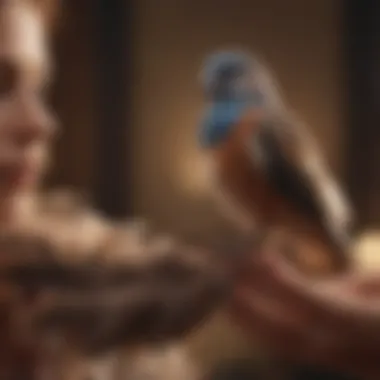
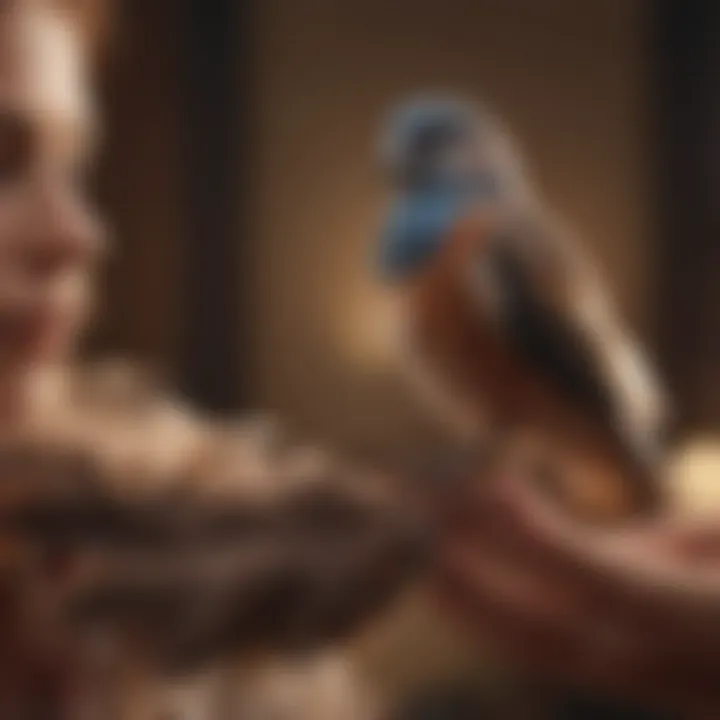
Another consideration is the emotional toll when that bond is broken. Pet birds can become integral parts of their owners' daily routines. Their absence can leave a void that is deeply felt. Recognizing this reality is crucial in the framework of coping with loss. Understanding how the bond is established makes it easier to appreciate the significance of the loss when it occurs.
Recognizing Attachment Styles
Attachment styles refer to the unique ways in which birds and their owners connect. By recognizing these attachment styles, owners can better understand their pets' behaviors and feelings. There are several types of attachment styles that pet birds may exhibit, which includes:
- Secure Attachment: These birds are comfortable around their owners and seek them out for companionship and comfort.
- Anxious Attachment: Birds with this style may cling to their owners or display signs of distress when separated from them.
- Avoidant Attachment: This style can manifest when a bird shows disinterest or avoidance of social interaction.
Understanding these styles can significantly impact how an owner processes grief after a loss. A secure attachment often indicates a deeply nurtured bond, which makes loss particularly challenging.
Behavioral Indicators of a Strong Bond
There are various behavioral indicators that suggest a strong bond between a bird and its owner. Paying attention to these signs can provide insights into the relationship's depth. Common indicators include:
- Vocalizations: Many birds develop specific sounds or songs that they use when interacting with their owners. This communication can be a sign of affection.
- Physical Proximity: Birds that prefer to be close to their owners or follow them around the house show signs of attachment. They often seek comfort from their human companions in various situations.
- Playfulness: Engaging in play and fun activities is often a clear sign of a bond. Birds that enjoy playing games or being active with their owners tend to have a secure relationship.
- Grooming Behavior: Birds often groom their owners in a sign of affection. This behavior reflects trust and companionship.
Recognizing these behaviors can help owners not only appreciate their time together but also understand the depth of their relationship when facing loss.
"The strong bond between pet birds and their owners shapes a unique experience that can profoundly affect the owner's emotional state when loss occurs."
In summary, the bond between birds and their owners is critical in understanding the grieving process after the loss of a pet bird. Recognizing attachment styles and behavioral indicators of a strong bond can provide valuable insights and prepare owners for the emotional impact of the loss.
Preparing for the Inevitable
Preparing for the inevitable loss of a pet bird requires a proactive approach. As difficult as it is to confront, anticipating this reality can offer some measure of comfort when the time comes. Discerning bird owners often recognize that their feathered companions have finite lifespans. Being aware of this can help in managing the emotional landscape surrounding their eventual passing. It also lays the groundwork for appropriate care, which can enhance a bird's quality of life.
Taking a systematic approach can yield significant benefits. For instance, understanding what to expect concerning a bird’s lifespan can help in aligning one's emotional and practical preparations. Additionally, health monitoring plays a vital role in identifying potential issues early, ensuring that one can provide the best possible care in the final stages of life.
Understanding Lifespan Expectations
Every bird species has its own average lifespan, and this is an important factor to consider for any potential or existing pet owner. Budgerigars, for example, typically live around 5 to 10 years, while larger species like macaws can live for 50 years or more. Understanding these differences is essential, as it shapes your approach to care and emotional investment in your pet.
Being informed about lifespan expectations fosters a realistic understanding of the time you have with your bird. This knowledge can aid in planning for future care needs or adjusting your daily interactions to enhance your bond. It allows for more meaningful engagements, as both owner and bird can make the most of their time together.
Health Monitoring of Pet Birds
Health monitoring is critical for the longevity of a pet bird and the emotional well-being of the owner. Regular checks can catch health issues before they become severe. Such vigilance is essential in prolonging life and improving quality of life for the bird.
Regular Veterinary Check-ups
Regular veterinary check-ups are key to maintaining a bird's health. These visits offer an opportunity for early detection of any hidden ailments. They can involve routine blood tests, weight monitoring, and assessments of behavior. Understanding that check-ups are important can change any preconceived ideas about bird care.
The main benefit of regular visits is preventive care. Catching health problems early can save you considerable distress later. The unique feature of these check-ups is that they establish a baseline for your bird's health. This means that any deviations from the norm can be identified quickly. However, some owners may find it challenging to manage these appointments due to the bird's stress or transportation issues.
Signs of Illness to Watch For

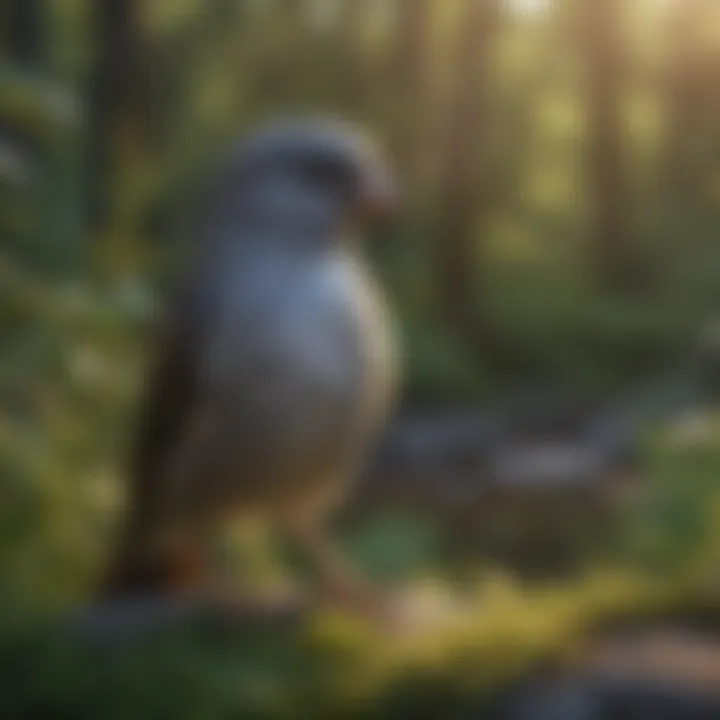
Being vigilant about signs of illness is crucial for bird owners. Common signs include changes in appetite, altered droppings, or unusual vocalizations. These indicators can help catch illness early.
The key characteristic of these signs is their variability; not all birds will present the same symptoms for the same illness. Understanding these signs is a beneficial strategy for owners, as it empowers them to act promptly. An often overlooked aspect is that many severe issues can develop without any visible cues until it is too late.
The unique advantage of monitoring these signs is that it enables you to respond in a timely manner. However, it can also lead to undue anxiety if you become overly focused on minor changes in behavior. Overall, having a balanced view when assessing your pet’s health can lead to better outcomes.
Coping Mechanisms After Loss
Coping with the loss of a pet bird requires understanding and practical strategies. It is essential to acknowledge the depth of grief that comes with such a loss. Each person's grieving process is unique. Adopting effective coping mechanisms can aid in navigating through pain while promoting emotional healing. These methods not only help in expressing grief but also in fostering resilience and understanding one's feelings better.
Allowing Yourself to Grieve
Grief is a natural response to the loss of a pet bird. It is crucial to allow yourself to feel this grief fully. Many pet owners experience a mix of emotions, ranging from sorrow to guilt. Allowing space for these feelings is important. Ignoring grief can lead to prolonged distress. Instead, express what you feel. Consider talking to friends, writing in a journal, or simply reflecting on your experiences. It's about recognizing your attachment to your pet bird and honoring that bond. Sometimes, creating a routine around remembering your bird can also help, such as setting aside time each week for reflection.
Seeking Professional Support
When grief feels overwhelming, seeking professional support can be beneficial. This support might come from different avenues, such as counseling or peers who understand your experience.
Pet Loss Support Groups
Pet loss support groups offer a safe space for individuals experiencing similar losses. This unique community facilitates healing through shared experiences. A key characteristic of these groups is empathy; participants often relate directly to each other’s pain. Many find solace in knowing they are not alone. Pet loss support groups are widely considered a beneficial option for grieving pet owners. They provide a structured environment where one can express feelings openly. However, it's essential to find a group that fits personal comfort levels.
Therapeutic Options
Therapeutic options help in dealing with grief productively. These methods include individual counseling, art therapy, and even pet therapy, which incorporates interaction with animals. A notable feature of therapeutic options is their tailored approach. Professionals can adapt techniques to suit individual needs. For those who seek traditional therapy, finding a mental health professional experienced in grief counseling can be very helpful. The benefits of these approaches often include improved coping skills and emotional expression. However, not everyone reacts the same way to therapy, so it's important to explore which option feels right for you.
Remember, the process of grief may take time, and seeking help is not a sign of weakness. It is a step towards healing.
Remembering and Honoring Your Bird
Losing a pet bird is a heartbreaking experience. Remembering and honoring the life of your feathered friend is essential in the grieving process. Taking thoughtful steps to memorialize a pet helps cope with the pain of loss. It provides a tangible way to celebrate the joy they brought into your life. This section highlights ways to create lasting memories and rituals that can aid in healing.
Creating a Memorial
Memorials serve as powerful reminders of the love shared with your pet bird. They can help keep the memory alive, making the grieving journey feel a bit lighter.
Physical Memorials
Physical memorials take various forms. They can include things like creating a small shrine at home. Perhaps displaying a photo frame that holds your bird's image, a favorite toy, or even their perch. The key characteristic of physical memorials is their permanence. This makes them a popular choice for many pet owners. By having something physically present reminds you of happy times.
A unique feature of physical memorials is the immediate connection they foster. They allow for reflection and remembrance in a space that feels personal. The advantage here is that you can see and interact with it daily, keeping your bird in your thoughts. However, one disadvantage might be the potential for these memorials to evoke deep sadness at times. Despite this, many find it beneficial because it validates the grief.
Digital Memorials
Digital memorials have gained traction, especially in the age of technology. They can be created on social media platforms or through memorial websites. The key characteristic of digital memorials is their accessibility. You can share and remember your pet bird with friends and family online. This way, you can invite others to join in celebrating your bird’s life.
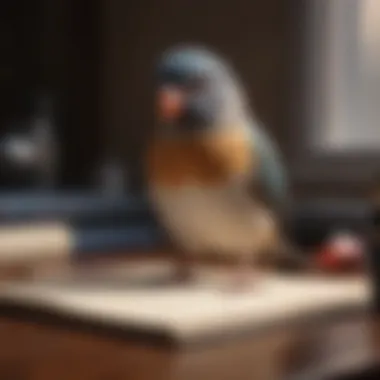
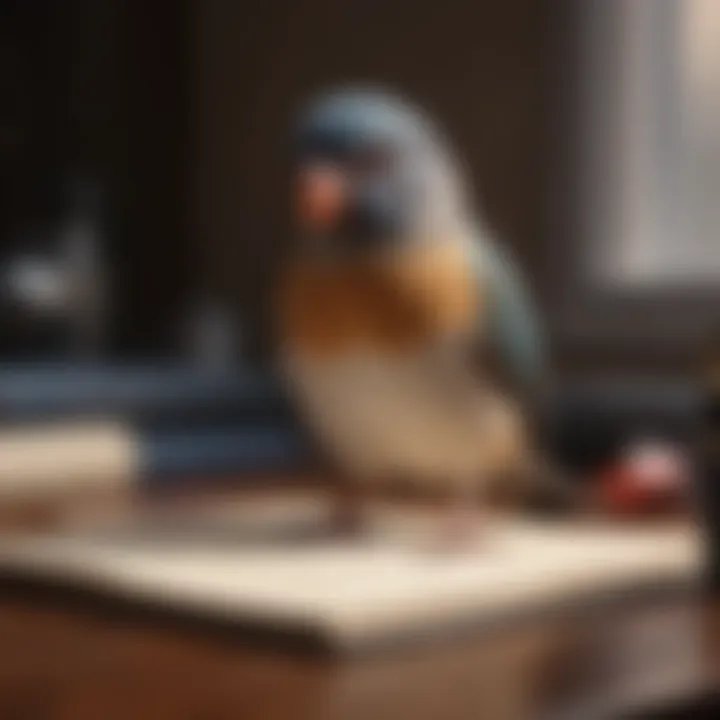
A unique aspect of digital memorials is their ability to reach a wider audience. They allow for sharing memories, stories, or even videos. The advantage here is that these memorials create a community. Others can comment, share their experiences, and express sympathies, lending support when needed. One disadvantage might be that not everyone feels comfortable sharing emotionally online. But, for many, they provide a comforting avenue to express grief.
Establishing Rituals
Establishing rituals can be a helpful way to navigate grief. This might include lighting a candle on specific days or playing songs that remind you of your bird. These rituals create a structured way to honor their memory. They offer comfort, as they create a routine that pays homage to the place your pet held in your heart.
By intentionally including your bird in your life’s rituals, you give space to your sorrow while cherishing the joy they brought into your life. You may find comfort in repeating these acts, as they allow for moments of reflection.
In closing, remembering and honoring your pet bird brings healing. It helps you navigate grief and continue the bond that you shared in life.
Moving Forward: When to Consider a New Bird
Deciding to bring a new bird into your life after losing one can be a complex journey. It involves emotional healing and assessing your readiness. This section emphasizes the important aspects to reflect on regarding the decision. Recognizing when you are ready is not just about filling a void but understanding your capacity for a new relationship with another bird.
Evaluating Readiness for a New Companion
Before adopting a new bird, evaluating emotional readiness is crucial. It is essential to take time after a loss. Rushing into a new pet can lead to unresolved feelings of grief. The process of evaluating readiness involves several factors:
- Time Since Loss: How long has it been since your pet passed? If it’s very recent, consider waiting until your feelings evolve.
- Emotional Stability: Are you able to think about a new bird without overwhelming grief? If you frequently think of your lost companion, it might be too soon.
- Support System: Do you have friends or family who can support your decision? Discussions with others can clarify your feelings.
Take the time needed to ensure you are emotionally prepared. This self-assessment will help in establishing a healthy relationship with a new companion.
Choosing the Right Bird
Selecting a new bird requires careful consideration of its species and needs. Knowing what type might fit your lifestyle can help avoid future issues related to care.
Researching Species
Researching species is integral to ensuring compatibility with your environment and lifestyle. Each bird species has unique social, dietary, and housing requirements. Popular choices, such as parakeets and cockatiels, may appeal due to their friendly nature.
- Key Characteristics: For instance, parakeets are social and energetic, making them suitable for homes with active lifestyles.
- Benefits: Understanding the habits and preferences of different species enhances the chance of a fulfilling ownership experience.
- Disadvantages: Some species might be more demanding in terms of care and attention. For example, larger parrots require more extensive social interaction.
Before deciding, spend time learning about their needs. This way, your next pet bird can thrive and ensure a good match for you both.
Understanding Lifespan and Needs
Understanding lifespan and specific needs of birds is vital for prospective bird owners. Different species can have vastly different life expectancies. A budgerigar may live approximately 5 to 10 years, while an Amazon parrot can live anywhere from 25 to 50 years.
- Key Characteristics: Knowing the lifespan of a chosen species informs your commitment expectations. Longer-living birds might mean a longer emotional investment.
- Benefits: Equipped with knowledge about care, diet, and socialization needs helps create a healthy environment for your new bird.
- Disadvantages: The needs may be higher for certain species. For instance, larger birds need spacious cages, socializing, and mental stimulation to stay healthy.
In summary, understanding these factors guides you toward making informed decisions. It not only ensures you are ready but also enhances the bond with your new companion beyond grief.
Final Thoughts on Grief and Loss
The experience of losing a pet bird carries a profound significance that deserves careful consideration. For many pet owners, birds occupy a unique place in their lives, offering any form of companionship that enriches daily experiences. The journey through grief after losing a feathered friend can be intricate and multifaceted. Understanding the emotional nuances is essential to effectively navigate this difficult terrain.
In recognizing the weight of loss, one must acknowledge that grief is not linear and does not conform to any specific timeline. Rather, it is a personal journey shaped by individual attachment and circumstances. Discussing these final thoughts emphasizes the importance of patience and self-compassion during the grieving process. Acknowledging the void left by a pet bird can also foster connections with others who have experienced similar loss, promoting discussions that can be healing.
Furthermore, the exploration of grief in the context of losing a pet bird offers several benefits that are critical for mental well-being. This includes understanding emotional responses and how they vary among individuals. Open conversations about pet loss and sharing experiences can not only validate feelings but can also create a community of support. Whether through informal gatherings or online groups, finding a tribe of like-minded individuals can bolster emotional resilience.
Also, grieving becomes an opportunity for introspection. It can trigger a reflection on the value of relationships and what it means to care for another being. As difficult as it is, acknowledging feelings connected to loss allows one to gain insights into personal emotions and coping mechanisms. This journey, although painful, can highlight inner strength and lead to a deeper appreciation for the time spent with a beloved pet.
In summary, this article has aimed to provide a comprehensive understanding of grief in relation to losing a pet bird and has presented strategies to cope, memorialize, and ultimately move forward. The narrative not only focuses on the emotional impact but also serves as a guide towards healing, illustrating that grief, while profound, can lead to meaningful growth.















